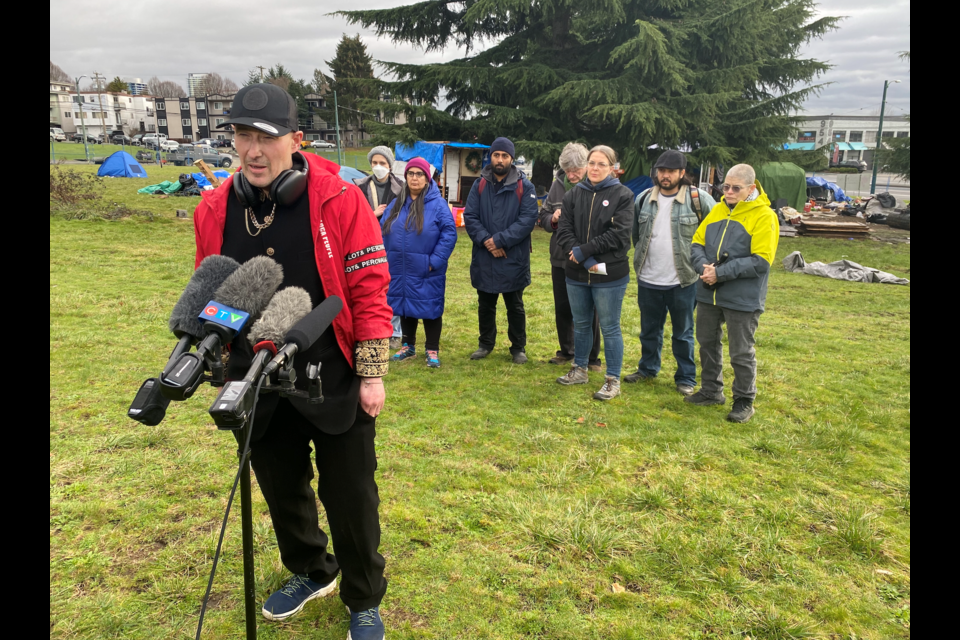Under a watchful eye of Â鶹´«Ã½Ó³»police officers Friday morning, B.C. Ministry of Transportation officials began removing an encampment near the Oak Street Bridge where close to a dozen people without homes had been living under a grove of trees that recently caught fire.
But while officials removed piles of debris and dozens of spent fuel tanks, highlighting the obvious safety risks of the homeless camp, two residents and local housing advocates said it’s unclear if they will have a permanent home to go to.
“We’re used to seeing these types of aggressive sweeps from (Â鶹´«Ã½Ó³»Mayor) Ken Sim but the provincial government coming in and stepping in and doing this aggressive sweep today proves that the provincial government is equally invested in the displacement of unhoused people,” said Ryan Sudds, member of the group Stop the Sweeps.
On Jan. 22, officials with the Ministry of Transportation posted a trespass notice on a temporary rental fence that lines half the area that’s highly visible to inbound commuters from the highway and nearby international airport.
But, according to campers, ministry officials only spoke to them directly on Monday — following a significant fire on Saturday that burned two tents and half a tree — and a housing provider at Carnegie Community Centre only visited Thursday night, leading to concerns about where they can keep their possessions.
One camper named Justin spoke to media at a scrum organized by Sudds Friday morning.
“Before this I was living in a moving truck with my stuff being stolen every day. Since being here I was able to hold on to my stuff,” said Justin.
“To all of a sudden being told I might get arrested and you have to leave in four days is a little jarring; and I didn’t know what to do and I still don’t know; we’re waiting to hear. So I’m just speaking out in support …of people on the streets,” said Justin.
Minister of Housing Ravi Kahlon has not commented to Glacier Media on this latest encampment. Staff at his ministry claimed outreach workers from the City of Vancouver, Social Development and Poverty Reduction and Â鶹´«Ã½Ó³»Coastal Health had been engaging with people on this site for many weeks.
On Friday, Premier David Eby supported the decampment, citing safety concerns.
He said while “it’s inappropriate to just be moving from one place to another place” such encampments “are not safe” and people are known to die in fires and be assaulted.
In recent years, in B.C. have established that it is unconstitutional for governments to prevent homeless people from sheltering overnight in public places if there are inadequate spaces to house everyone in need of shelter.
Anna Cooper, a staff lawyer with non-profit legal advocacy group Pivot Legal Society, was at the site on Friday, speaking to media.
“How are people going to be more fire safe when they are evicted here but set up shelter somewhere else? So, maybe in that case they go somewhere more isolated because they try to avoid enforcement actions like this. So they have all the same stuff, all the same hazards but now they’re alone and no one’s driving by calling 911 if there is a fire,” said Cooper.
“I think the important thing to understand is that there is no location where people are currently allowed to shelter outside on a more than overnight basis that this government does not consider illegal.
“So when trying to assess where people should be you can’t just be thinking about what are the reasons they can’t be here. You have to be thinking about where can people be. You have to have space to exist. You can’t be safe if you can’t exist. So talking about safety when we literally have decided there is no space for people to exist is a very cynical thing to do and it’s what this government is currently doing.
“I am not aware of a single piece of public property in the entire region where any level of government would say an unhoused person can legally shelter,” added Cooper.
A recent study from Simon Fraser University researchers asserts a patchwork of laws and regulations are stacked against homeless and precariously housed people, who face a systemic loss of their possessions.
The number of people in Metro Â鶹´«Ã½Ó³»identified as homeless during an official count in March totalled 4,821 — a 32 per cent increase over the last regional count in March 2020 when 3,634 were recorded without a home.
It has more than doubled since the BC NDP took power in 2017.
Kahlon claimed since the BC NDP took power in 2017 “more than 4,800 people who were homeless, or at risk of being homeless, moved into new supportive housing units in more than 30 communities throughout the province.”
This article was edited to note Pivot is a legal advocacy group


